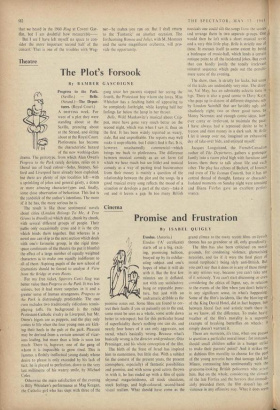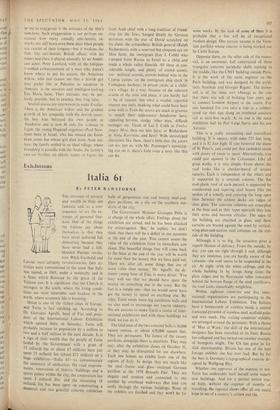Cinema
Promise and Frustration By ISABEL QUIGLY Exodus. (Astoria.) 'Exodus ('A' certificate) starts off as a big, excit- ing, promising balloon, buoyed up by its exhilar- ating subject and one's hopes of what it will do with it. But the first few minutes see it deflated, not with any satisfactory bang or reparable punc- ture, but just with an undramatic dribble as the promise oozes out. Some films are found to cor- rect their faults if you sit patiently on to the end, some must be seen as a whole, some settle down better in retrospect; but for this particular brand of superficiality there's nothing one can do, and nearly four hours of it can only aggravate, not mend, what's basically wrong. Because what's basically wrong is the director and producer, Otto Preminger, and his whole conception of the film.
The birth of the State of Israel has inspired him to earnestness, but little else. With a subject (in the context of the present years, the present atmosphere, especially) of fantastic possibilities and promise, and with some good actors thrown in with it, he has ended up with a film of quite abysmal magazinishness, all stock situations, stock feelings, and high-coloured, second-hand visual realism. What should have come as the grand climax to the many recent films on Jewish themes has no grandeur at ail, only grandiosity.
The film has also been criticised on moral grounds, for condoning violence, glamorising terrorists, and .(as if it were the final piece of moral turpitude!) being slyly anti-British. But you can't say that it does or is any of these things in any serious way, because you can't -take aay of it seriously. You can't start discussing or even considering the ethics of Irgun, say, in relation to the events of the film when you don't. believe, in any significant sense, in what's happening, Some of the film's incidents, like the blowing-uP of the King David Hotel, did in fact happen, but between literal fact and artistic truth there is. aswe know, all the difference. To make heavy weather of the film's morality is a supreme example of breaking butterflies on wheels: it simply doesn't warrant it. There are moments, it's true, when one pauses to question a particular moral issue: for instance, should small children suffer in a hunger strike to make their parents' point? And it strikes me as dubious filet morality to choose for the part pi the young terrorist hero that teenage idol Sal Mineo, contrasting him sentimentally with the gruesome-looking British policemen who arrest him. But on the whole, considering the climate of the late Forties and the horrors that immedi- ately preceded them, the film doesn't lay on violence in any offensive way. What it does seem
to me to exay,gerate is the attitudes of the film's non-Jews. Such exaggeration is not perhaps un- ha:livid—how many casually anti-Semitic re- marks one still hears even these days when people ate careful of their tongues—but it weakens the film. The anti-Semitic British officer, with his sneers and jibes, is played, absurdly, by an Ameri- can actor, Peter Lawford, with all the lollipop- mouthed embarrassment of a man who doesn't know where to put his accent; the American widow, who just cannot see that a Jewish girl may prefer life in Palestine to adoption in America is the sensitive and intelligent-looking I've Marie Saint. Their attitudes may be per- lectly possible, but in practice they ring false.
Several stories are interwoven to make Exodus. 1 here is the American widow and the gradual growth of her sympathy with the Jewish cause; the boy who betrayed his own people at Auschwitz and is now fit only for violence in Irgun; the young Haganah organiser (Paul New- man) born in Israel, who has missed the Euro- pean ovens but whose girl died from Arab tor- ture: the family settled in an ideal village. where friendship is possible with the Arabs: the family's cast-ouf brother. an elderly leader of Irgun: the local Arab chief with a long tradition of friend- ship for the Jews, hanged finally by German terrorists with the star of David scratched on his chest, the sympathetic British general (Ralph Richardson), with a reserved but eloquent eye on Miss Saint; the immigrant (Lee J. Cobb) who tramped from Russia to Israel as a child and made a whole valley flourish. All these at con- siderable length, and plenty of crowd scenes, too: political crowds, crowds behind wire in the Cyprus camps, on the immigrant ship stuck in Famagusta harbour, in prison yards, at a child- ren's village. In a way. because of the inherent drama of the time and place, it can hardly fail to be of interest; but what a wistful, regretful interest one feels, thinking what could have been done with it. Even the actors are stuck in grooves to match their appearance—handsome hero, appealing heroine, stodgy 'other man,' difficult teenager, etc. Think of Lee J. Cobb in Twelve . 'Angry Men, then see him here; or Richardson in Anita Karenina, and here! With stereotyped characters like these, there's little that the actors can do; just as. with Mr. Preminger's stereotyp- ing eye on it, there's little even a story like this can do.







































 Previous page
Previous page